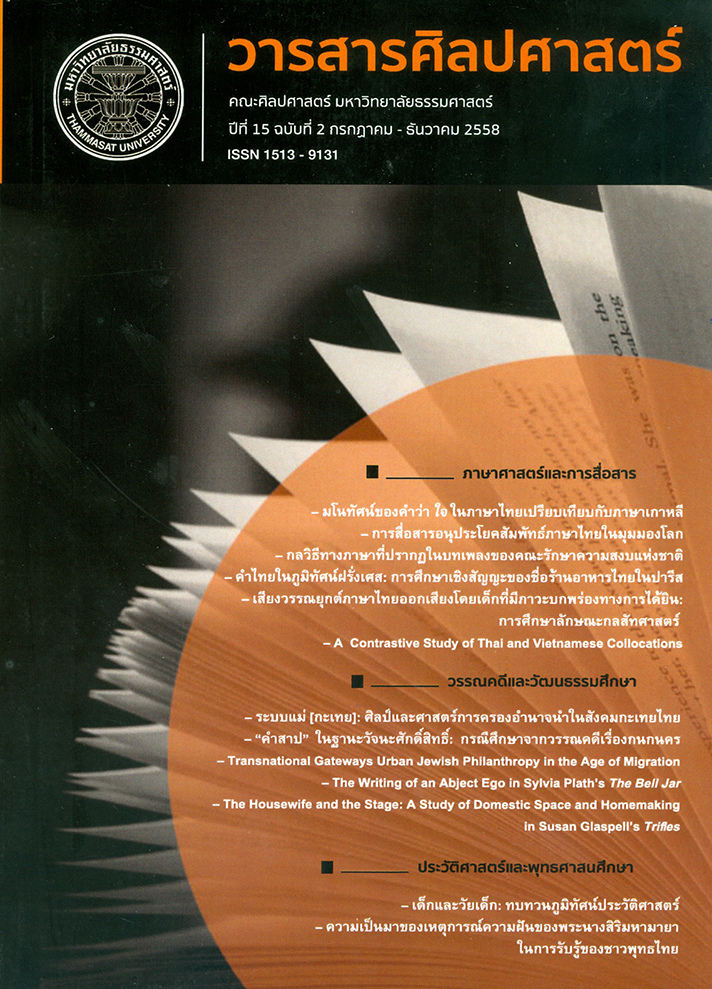มโนทัศน์ของคำว่า ใจ ในภาษาไทยเปรียบเทียบกับภาษาเกาหลี
Main Article Content
บทคัดย่อ
ใจ เป็นคำเรียกอวัยวะในภาษาไทยที่ใช้บ่อยมากที่สุดคำหนึ่ง โดยปรากฏใช้ทั้งในความหมายต้นแบบ หรือความหมายที่บ่งชี้อวัยวะร่างกาย และในความหมายที่ขยายออกมา เช่น ความหมายเชิงนามธรรม รวมทั้งปรากฏในสำนวนต่าง ๆ ด้วย นักภาษาศาสตร์ปริชานมองว่าอุปลักษณ์เป็นกลไกทางปริชานที่มนุษย์ใช้เป็นปกติในชีวิต ประจำวัน กล่าวคือ เป็นกลไกที่ก่อให้เกิดความเข้าใจและตรรกะ โดยผ่านการนำความรู้ใหม่หรือสิ่งที่เป็นนามธรรม มาเปรียบเทียบกับความรู้เก่าหรือสิ่งที่เป็นรูปธรรม การศึกษาปรากฏการณ์พหุนัยหรือการขยายความหมายของคำจะช่วยให้เข้าใจกระบวนการทางปริชานที่เรียกว่า อุปลักษณ์ และระบบปริชานของผู้ใช้ภาษาได้ งานวิจัยนี้ได้ศึกษามโนทัศน์ของคำว่า ใจ ในภาษาไทย เปรียบเทียบกับคำว่า 마음 /maeum/ (“ใจ”) ในภาษาเกาหลี โดยวิเคราะห์มโนอุปลักษณ์ต่างๆ ที่เป็นพื้นฐานของการใช้ภาษา ซึ่งจะเป็นประโยชน์ในการศึกษาการขยายความหมายของคำเรียกอวัยวะคำอื่นๆ ในภาษาไทยและภาษาเกาหลี พร้อมทั้งแสดงให้เห็นลักษณะของการขยายความหมายและการสร้างมโนทัศน์ในภาษาไทยและภาษาเกาหลีได้อย่างชัดเจน
คำสำคัญ คำเรียกอวัยวะ ภาษาศาสตร์ปริชาน อุปลักษณ์ มโนทัศน์ ใจ
One of the most frequently used body part terms in Thai would be ใจ /chai/, which means “heart” or “mind.” However, the term is used more than just to indicate a body part; /chai/ is also used in various idioms and expressions and conveys a substantial number of abstract meanings. In Cognitive Linguistics, metaphor is considered a cognitive mechanism of understanding and reasoning, which humans unconsciously use in everyday life to understand more abstract domain by mapping to more concrete domain, and research on the aspects of meaning extension of body part terms among basic vocabulary may furnish important linguistic clues that help clarify the cognitive system of language speakers. This research explores the concept of /chai/ in Thai in comparison with the correspondent word /maeum/ in Korean, as well as grasps the difference between the conceptualization of /chai/ in the two languages. This research may be a basis for contrastive analysis of aspects of meaning extension of other body part terms, and helps comprehend the characteristics of meaning extension and conceptualization in Thai and Korean.
Keywords: Body part term, Cognitive linguistics, Metaphor, Conceptualization, Mind


